This post may contain affiliate links. Please read our disclosure policy.
In this Tokyo Food Guide, you’ll find our recommendations on the 20 top best foods to eat in the city! From the best sushi to the latest food craze to iconic street foods, these are the unmissable foods you must try when visiting Tokyo.
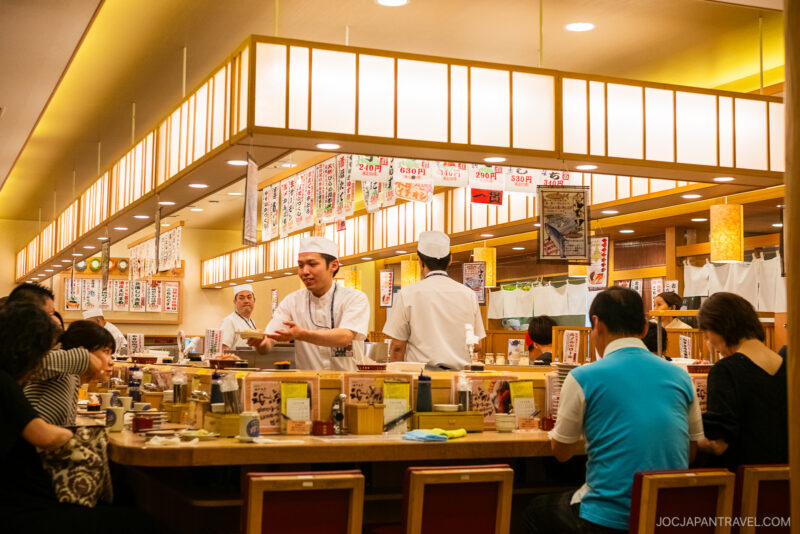
It’s no exaggeration to say that food alone is reason enough to visit Tokyo. The city’s decades-long devotion to culinary perfection has earned it more Michelin stars than anywhere else in the world except France. Are you ready to embark on an epic gastronomic adventure?
But where do you start? With so many incredible dishes and so little time, choosing what to eat can feel overwhelming. Luckily, there’s really no bad meal in Tokyo.
To help you make the most of your trip, we’ve rounded up 20 must-try foods in Tokyo—each one iconic, delicious, and deeply tied to the city’s food culture. You’ll also find our top restaurant recommendations for each dish so you can enjoy them at their best.
This list is far from exhaustive, but it’s the perfect place to start. Just be sure to arrive hungry!
1. Sushi

Tokyo, the world capital of sushi (寿司), is where you get next-level sushi that sets them apart from sushi in the rest of the world. Two key factors: the incredible abundance of fresh seafood and the time-honored skill that goes into crafting the perfect vinegared sushi rice. It’s no wonder sushi is the dish most synonymous with Japanese cuisine.
The best part? Delicious sushi in Tokyo is accessible at every budget.
- On a budget: Visit casual kaiten zushi (conveyor belt sushi) restaurants, where you can enjoy a wide selection of fresh seafood without breaking the bank. They are our favorite places to indulge as much sushi as possible!
- For a special experience: Tokyo is home to revered Michelin-starred sushi establishments, offering a theatrical, unforgettable dining experience—if your budget allows.
JOC Recommended Sushi Restaurants in Tokyo
You also can’t go wrong at sushi joints inside Toyosu and Tsukiji Fish Markets. Arrive early and enjoy multiple sushi breakfasts. Sushi Dai and Daiwa Sushi are the best, but any shop with lines of locals will not disappoint.
2. Ramen

Perfectly chewy noodles, jammy ramen eggs, juicy chashu pork, bamboo shoots, and crisp nori floating in a steaming bowl of broth. Ramen (ラーメン) needs no introduction. Having taken the world by storm, this Japanese soul food reigns supreme in Tokyo, and it just keeps evolving.
You’ll find ramen shops everywhere: tucked behind train stations, hidden on narrow streets, or inside bustling department buildings. From rich tonkotsu ramen to delicate shio ramen, savory miso ramen, spicy shoyu ramen, refreshing tsukemen, and even cold ramen, the variety is endless. A new generation of ramen masters is also redefining tradition with creative, fusion-style bowls.
No matter where you go, Tokyo is the place to get your ramen fix—so slurp away!
JOC Recommendations: Best Ramen in Tokyo
Shio Ramen
- Menya Kaijin (Shinjuku) – Try “Arataki Shio Ramen”
- Taishio Soba Touka (Akebonobashi) – Try “Taishio Soba”
- Afuri (Ebisu, Nakameguro, Harajuku, Roppongi, etc) – Try “Shio Ramen,” “Yuzu Shio Ramen,” and “Ooba Kaoru Ume Shio Ramen
Shoyu Ramen
- Konjiki Hototogisu (Shijuku Gyoen) – Try “Soba (Shoyu)”
- Kiraku (Shibuya) – Try “Chukamen” and “Char Siu Wonton Men”
- Isshin (Meguro) – Try “Toku Shoyu Ramen”
Miso Ramen
- Ichifuku (Shibuya) – Try “Miso Ramen”
- Ramen Dining Do Miso (Kyobashi, Marunouchi) – Try “Toku Miso Kotteri Ramen” and “Toku Shiro Miso Kotteri Ramen”
Others
- Kagari (Ginza)
- King Seimen (Ouji)
“Ramen Streets” in Tokyo
Why settle for one bowl when you can taste them all? Tokyo’s famous ramen streets bring together top ramen shops in one convenient location—perfect for sampling different regional styles and flavors.
- Tokyo Ramen Street – Conveniently located outside the ticket gate of Tokyo Station, the biggest train hub in Tokyo, this ramen hub hosts seven ramen shops from around the country plus a rotating pop-up every 101 days. It’s a worthy detour even if you’re not passing through the station!
- KITTE Ramen Battle Zone at KITTE GRANCHE – Just across from Tokyo Station, KITTE’s Ramen Battle Zone offers five popular ramen shops. It’s a favorite lunchtime spot for office workers, so avoid peak hours. Don’t miss Tomita Ramen, made famous by the documentary Ramen Head.
- Shin-Yokohama Ramen Museum – Part museum, part amusement park, the Shin-Yokohama Ramen Museum lets you eat, learn, and even make ramen yourself. Advanced reservations are required for the ramen-making classes (check the official website). Each shop also serves half-sized portions, so you can taste your way through the lineup without overfilling!
3. Tempura

We may be biased, but no other cuisine does deep-fried food quite like the Japanese. Tempura (天ぷら) is proof of that! What’s not to love about plump shrimp or tender sweet potato enveloped in the lightest, crispiest batter?
In Tokyo, you’ll find everything from humble counter spots to refined tempura specialty restaurants, where chefs perfect the art of deep-frying one ingredient at a time. The result: delicate, golden bites that are crisp on the outside and impossibly light within.
JOC Recommended Tempura Restaurants in Tokyo
- Tempura Abe (Ginza)
- Tsunahachi (Shinjuku, Ginza, Tokyo, etc)
- Tempura Kondo (Ginza)
4. Yakitori

Yakitori (焼き鳥) are tasty skewered chicken meat brushed with a sweet soy glaze and grilled over charcoal. While chicken is the star, many yakitori shops also serve other meats and vegetables—each cooked to smoky, juicy perfection.
Tokyo’s yakitori scene is where you can truly appreciate the Japanese art of chicken butchery. Every part of the bird is valued: from tender thigh and breast to flavorful liver, gizzard, and crisped skin.
The best places to enjoy yakitori are izakaya (Japanese gastropubs) and specialty yakitori restaurants, where chefs skillfully balance flame, timing, and sauce for the perfect bite.
JOC Recommended Yakitori Restaurants in Tokyo
- Torikizoku (Shinjuku, Shibuya, Tokyo, etc)
- Torishiki (Shinagawa)
- Kushiwakamaru (Nakameguro)
5. Japanese Curry

Introduced to Japan by the British in the late 1800s, Japanese curry (カレー) has since become one of the country’s most popular comfort foods. Unlike Thai or Indian curries, the Japanese version is thicker, milder, and slightly sweet, with a stew-like texture that makes it easy for everyone to enjoy, even kids!
You’ll find this cozy dish served in many forms, from curry rice (kare raisu) to curry udon and katsu kare, which features a crispy breaded pork cutlet smothered in rich curry sauce.
JOC Recommendations for Tokyo’s Best Curry Spots
- Hiroo no Curry (Hiroo)
- Hinoya Curry (Shinjuku, Ikebukuro, Shibuya, etc)
6. Soba

Simple yet deeply satisfying, soba (蕎麦) noodles embody the refined, understated elegance that Japanese cuisine is known for. The best soba is usually handmade in-house from scratch, offering a delicate texture and nutty flavor that highlights the quality of the buckwheat.
Light, healthy, and soul-satisfying, a bowl of soba is perfect for when you want a meal that is both nourishing and elegant. We love our soba with a side of tempura!
JOC Recommended Soba Restaurants in Tokyo
- Kawakami An (Azabu Juba, Aoyama)
- Kanda Yabusoba (Kanda)
- Kanda Matsuya (Akihabara)
- Nunotsune Sarashina (Omori)
7. Tonkatsu

Tonkatsu (とんかつ) is Japan’s take on the classic breaded, deep-fried pork cutlet, similar to a schnitzel. It has been a working-class dish and a Japanese comfort-food staple for centuries.
Much like everything in Japan, tonkatsu can be both casual and very high-end. But, the very best tonkatsu is crispy on the outside, juicy on the inside, and remarkably light, almost grease-free. It’s typically served with sweet-savory tonkatsu sauce, fluffy steamed rice, shredded cabbage, pickles, and miso soup.
JOC Recommended Tonkatsu Restaurants in Tokyo
- Tonki (Meguro)
- Butagumi (Azabu)
- Tonkatsu Maisen (Aoyama, Shibuya, etc)
8. Gyukatsu (Beef Katsu)
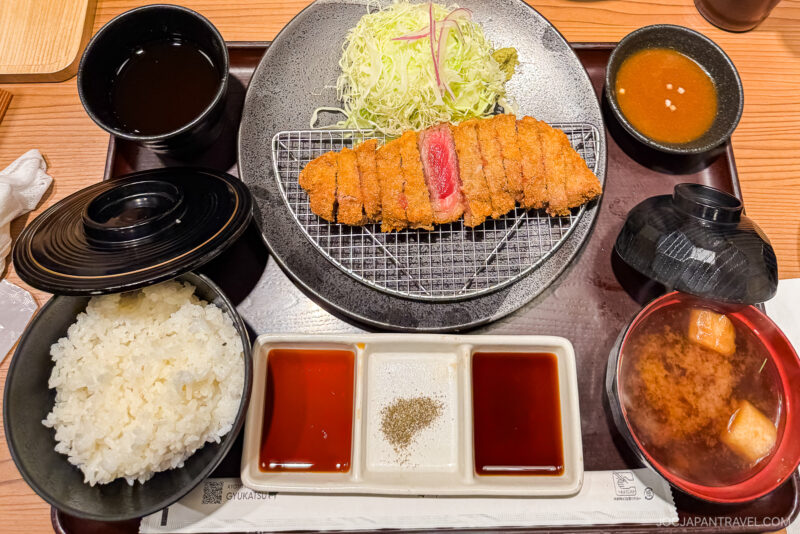
Meet one of the trendiest stars of Japanese cuisine: Gyukatsu (牛カツ), the beef equivalent of tonkatsu. Since gaining popularity around 2015, breaded and deep-fried beef cutlets have become a must-try dish in Tokyo.
Gyukatsu features a crispy exterior with a rare to medium-rare interior and is also served with dipping sauces, steamed rice, shredded cabbage, pickles, and miso soup. At many restaurants, you even get to grill the meat to your preference on a small burner at your table, creating a personalized dining experience.
Juicy, tender, and perfectly crunchy, gyukatsu is a dream for meat lovers. Does it live up to the hype? Absolutely! Many visitors report it as one of their most memorable dishes in Tokyo.
Best Gyukatsu Restaurants in Tokyo
- Gyukatsu-MOTOMURA (Shibuya, Shinjuku, Hamamtsucho, etc)
- Gyukatsu Aona (Shinjuku, Ueno, etc)
- Gyukatsu Iroha (Ikebukuro)
9. Sukiyaki

Sukiyaki (すき焼き) is a beloved Japanese hot pot, especially enjoyed during the cooler months. Thinly sliced meat and fresh seasonal vegetables are simmered in a sweet-and-salty soy sauce-based broth, creating a rich, comforting dish that warms the soul.
If you visit Tokyo in fall or winter, sukiyaki is a must-try. Served in a communal pot at the table, it’s as much about the experience as it is about the flavors.
JOC Recommended Sukiyaki Restaurants in Tokyo
10. Udon

Another must-try Japanese noodle is udon (うどん). Thick, chewy, and silky-smooth, udon noodles are the ultimate comfort food—perfect for melting away the stresses of the day.
Udon can be enjoyed in many ways: hot in a savory dashi broth topped with crispy tempura, chilled with umami-rich mentsuyu sauce, or even in creative fusion dishes like udon carbonara. Popular variations include beef udon, kitsune udon (topped with sweet fried tofu), and yaki udon (stir-fried noodles with vegetables and meat).
JOC Recommended Udon Restaurants in Tokyo
- Oniyanma (Gotanda, Nakameguro, Shimbashi, etc)
- Tsurutontan (Roppongi, Shinjuku, Ginza, etc)
- Udon Yamacho (Ebisu)
11. Yakiniku

Yakiniku (焼肉) is the Japanese take on barbecue, featuring a fine selection of tender meats, fresh vegetables, and savory dipping sauces served right at your table. Everyone sits around the grill, cooks, and eats the food. It’s the most delicious and jovial way to experience Japanese communal meals.
JOC Recommended Yakiniku Restaurants in Tokyo
- Yakiniku Champion (Ebisu, Nakameguro, Ikebukuro, etc)
- Yakiniku Ushigoro (Ginza, Nishi Azabu, Omotesando)
- Yakiniku Jumbo (Shirokane, Hongo)
12. Shabu Shabu

When the weather turns chilly, Tokyo locals love to gather around shabu-shabu (しゃぶしゃぶ), a Japanese hot pot that’s as interactive as it is comforting. The name comes from the “swish-swish” sound of thinly sliced meat and vegetables being stirred in the simmering broth.
Shabu-shabu is a social dining experience. Everyone sits around the hot pot, cooks their own ingredients, and enjoys the flavors while chatting, creating delicious memories with every bite.
Best Shabu-Shabu Restaurants in Tokyo
13. Monjayaki

You may have heard of okonomiyaki, but that dish is more famous in the Kansai region, like Osaka. In Tokyo, it’s monjayaki (もんじゃ焼き)—often called monja—that steals the spotlight. Monjayaki is similar to okonomiyaki: finely chopped ingredients are mixed into a flour batter and cooked on a hot grill.
The key difference? Monjayaki includes extra dashi in the batter, giving it a runny, gooey texture that’s fun to eat right off the grill.
JOC Recommended Monjayaki Restaurants in Tokyo
The best place to experience monjayaki is Tsukishima Monja Street, where the dish originated. Tsukishima Monja Street is lined with restaurants specializing in this Tokyo specialty, so you get to explore and taste different styles.
Other options:
- Monja Kura (Tsukishima)
- Sozai & Monja Sato (Yoyogi)
If you’re craving okonomiyaki, there are also great spots in Tokyo, such as sante-kan, which offers a Kansai-style experience without leaving the city.
14. Teppanyaki

While teppanyaki (鉄板焼き) restaurants exist outside Japan, only in Japan can you savor the finest marbled wagyu beef and the freshest seafood, cooked with skill and showmanship on a teppan (iron griddle). Teppanyaki is a feast for the senses, fusing the precision of Japanese cooking with Western-inspired techniques.
At most Tokyo teppanyaki restaurants, diners sit around an open grill to watch chefs perform culinary tricks reminiscent of dinner theater, grilling meat, seafood, and vegetables with flair. Unlike casual teppanyaki abroad, Tokyo’s teppanyaki dining is usually upscale, especially in the Kanto region. You have to save up for the unmatched teppanyaki experience, but it’s worth it!
JOC Recommended Teppanyaki Restaurants in Tokyo
- Ginza Ukai Tei (Ginza)
- Okahan Honten (Ginza)
- Atelier Morimoto XEX (Roppongi)
15. Japanese Sandwiches

While rice and noodles have long been staples of Japanese cuisine, Japanese sandwiches (サンドイッチ) have been gaining attention both in Japan and internationally. Far from being just grab-and-go food, these sandwiches showcase Japanese precision and culinary creativity, from perfectly balanced flavors to beautiful presentation.
Some must-try varieties include:
- Tamago Sando – A fluffy Japanese egg salad sandwich.
- Katsu Sando – Crispy pork cutlet sandwich, a hearty favorite.
- Fruit Sando – Soft bread layered with fresh cream and seasonal fruits, as visually delightful as it is tasty.
Where to Find the Best Japanese Sandwiches in Tokyo
- Convenience stores – Quick and convenient, often surprisingly high-quality.
- Specialty bakeries – Handmade sandwiches with artisanal bread and fillings.
- Department store gourmet floors – Usually on the B1 level, offering premium sandwiches from famous shops.
16. Japanese Pastries

While the French often get the spotlight for pastries, Tokyo’s Japanese pastries (ケーキ・お菓子) hold their own, blending precision, creativity, and seasonal ingredients in truly remarkable ways. Japanese pastry chefs seamlessly incorporate influences from around the world while highlighting local flavors, resulting in an array of treats that are both beautiful and delicious.
For sweet pastries, try matcha green tea, cherry blossom, chestnut, black sesame, yuzu, red bean, or Japanese sweet potato flavors. On the savory side, Tokyo offers freshly baked hot buns such as curry pan (crispy bread filled with curry), melon pan (sweet bread with a crisp biscuit crust), and anpan(sweet red bean bun).
JOC Favorite Pastry Shops in Tokyo
- Viron Brasserie (Marunouchi)
- Criollo (Itabashi)
- Bread, Espresso & (Shibuya)
- Kimuraya Bakery (Ginza)
17. Unagi

One of Japan’s summer traditions is enjoying unagi (鰻), or freshwater eel, believed to boost stamina and energy during the hottest days. On the Day of the Ox (Doyo no Ushi) in midsummer, it’s customary to eat unagi to stay strong and healthy under the summer sun.
Popular unagi dishes include:
- Unadon – Grilled eel served over steamed rice.
- Unagi Nigiri – Sushi-style rice topped with a slice of grilled eel.
- Shirayaki – Simply roasted eel seasoned with salt.
- Eel Hone Senbei – Deep-fried eel bones, often enjoyed as a snack with drinks.
- Kimosui – Clear soup flavored with boiled eel liver.
You can find unagi at most sushi restaurants, but for a dedicated experience, Tokyo has specialty restaurants devoted entirely to eel dishes.
JOC Recommended Unagi Restaurants in Tokyo
- Aikawa (Takadanobaba)
- Ishibashi (Edogawabashi)
- Hatsuogawa (Asakusa)
18. Yoshoku

Yoshoku (洋食) is Japanese-style Western food that is as central as traditional Japanese food. Rather than simply fusing French, Italian, or Western flavors, yoshoku reflects a distinctly Japanese innovation, adapting ingredients and preparation techniques to create uniquely local versions of Western classics.
Mainstream yoshoku dishes include omurice (omelet rice), Hayashi rice, beef stew, hambagu (hamburger patties), and wafu pasta. Tonkatsu and Japanese curry, already highlighted above, also fall under the yoshoku category.
Visiting Tokyo with kids or picky eaters? Don’t even think about McDonald’s when you have so many yoshoku dishes to choose from!
Where to Enjoy Yoshoku in Tokyo
You can enjoy yoshoku almost anywhere in Tokyo: casual chain diners (famiresu), cafes, kissaten (old-school coffee houses), hotel restaurants, and even convenience stores. Many establishments have proudly served signature dishes for decades, loved by artists, celebrities, and politicians alike.
Here are a few of our favorite yoshoku restaurants:
- Taimeiken (Nihonbashi)
- Shinsekai Grill Bon (Ginza)
- Shiseido Parlour (Ginza)
19. Wagashi (Japanese Sweets)

Japanese sweets, known as wagashi (和菓子), are delightful tea treats that carry a rich history entwined with Japanese culture. They come in a variety of shapes, textures, and flavors, often reflecting the seasons and Japanese aesthetics.
Some of the must-try wagashi include:
- Dorayaki – Mini pancake sandwiches filled with sweet red bean paste.
- Dango – Skewered rice flour dumplings, often served with sweet sauces.
- Manju – Steamed buns filled with red bean paste.
- Senbei – Savory or lightly sweet rice crackers.
- Mochi – Soft, chewy rice cakes in assorted flavors.
If you’re visiting in the summer, treat yourself with kakigori (shaved ice with syrups and toppings) and anmitsu (agar-agar jelly with sweet toppings).
JOC Recommended Wagashi Shops in Tokyo
- Toraya (Asakusa)
- Minamoto Kitchoan (Ginza)
- Nana’s Green Tea (multiple locations)
You can also find wagashi at airports, major tourist areas, and department store gourmet floors, making it easy to taste or take home a piece of Japanese tradition.
20. Fruit Parfait
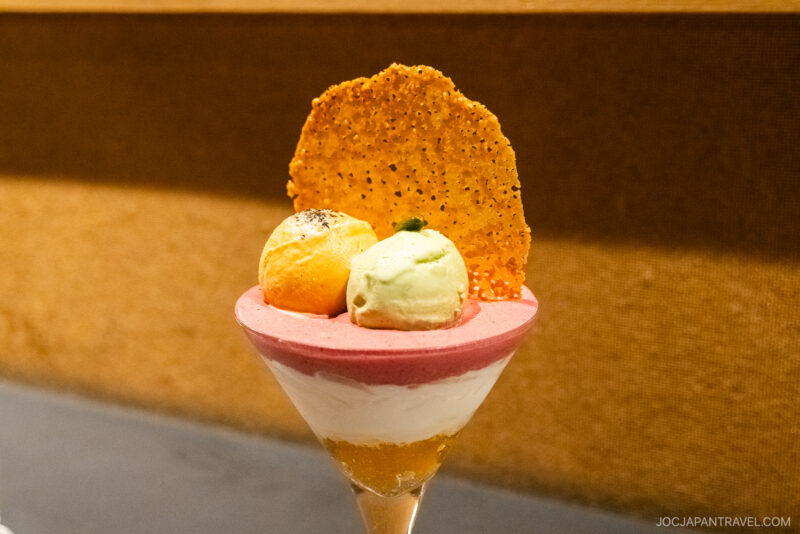
While strolling the bustling streets of Tokyo, you’ll often spot tall, decorative fruit parfaits (フルーツパフェ) in the windows of coffee shops (kissaten 喫茶店) and family restaurants. These colorful, layered desserts are a classic sweet treat in Japan, enjoyed year-round for their combination of ice cream, fresh fruit, whipped cream, and other toppings.
Popular flavors include strawberry, chocolate, and matcha (green tea), while seasonal offerings may feature peach, melon, or other fresh fruits, reflecting Japan’s dedication to seasonal ingredients.
JOC Recommended Fruit Parfait Spots in Tokyo
- Fruits Parlor Goto (Asakusa)
- Sembikiya (Nihonbashi)
- Takano Fruits Parlor (Shinjuku)
Tips on How to Find The Best Foods to Eat in Tokyo
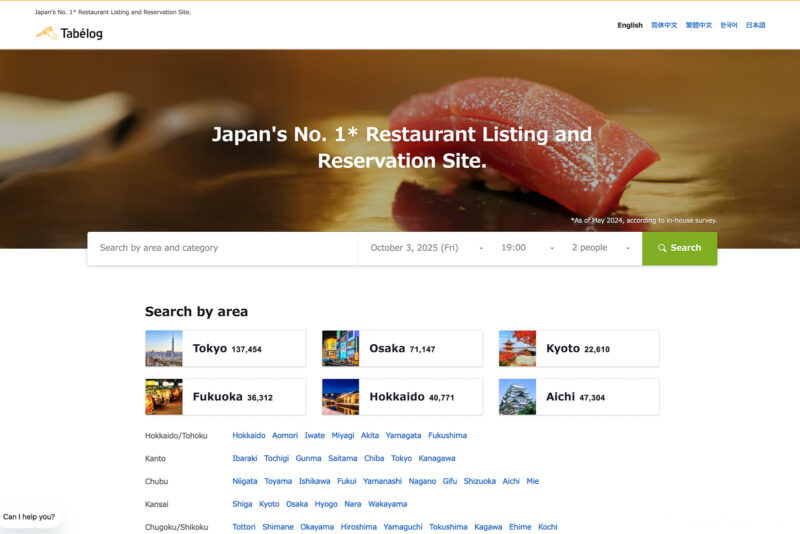
- Use Tabelog Japan’s Restaurant Guide – Tabelog is the most comprehensive restaurant review site in Japan. You can search by food category, location, and ranking score, making it easier to discover Tokyo’s best eats.
- Check out our article on how to use Tabelog for step-by-step guidance.
- Explore Depachika – If you want to sample a variety of foods at an affordable price, head to a depachika, the basement floor of Japanese department stores. You’ll find everything from fresh sushi and bento to desserts and snacks.
- Check out our Shinjuku ISETAN food floor guide.
- Konbini & Vending Machines – Traveling on a backpacker’s budget? Japanese convenience stores (konbini) like 7-Eleven, Lawson, and FamilyMart are lifesavers. You can find decent ramen, sandwiches, onigiri, and even yakitori ready to eat. Vending machines also provide quick snacks and drinks at any time of day.
- Discover Hole-in-the-Wall Eateries – Don’t be afraid to try small, hidden restaurants tucked away in alleyways. A line outside is often a good indicator of quality and popularity. Some of the most memorable meals in Tokyo are found this way.
Pro Tips for Japanese Food Lovers
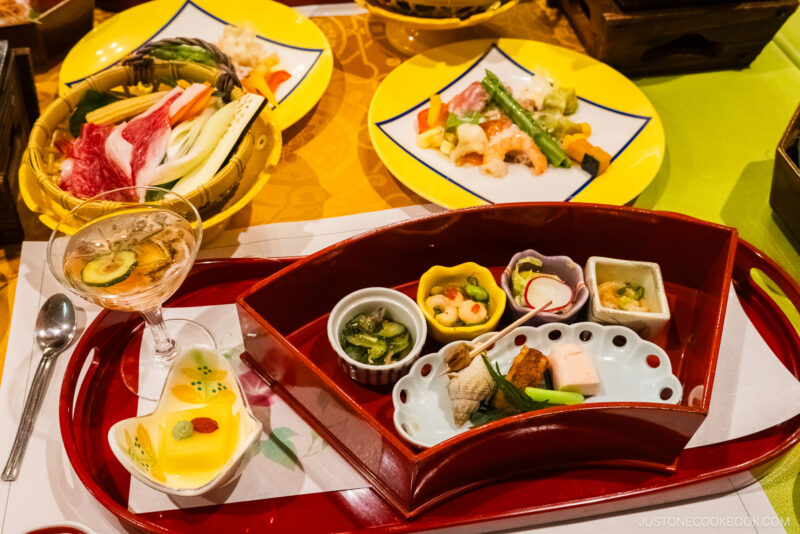
Try Kaiseki Ryori
For a truly unique Japanese dining experience, try kaiseki kaiseki ryori, a traditional multi-course meal emphasizing seasonality, presentation, and culinary artistry. Kaiseki is Japan’s haute cuisine and is typically served at ryokans, high-end hotels, and ryotei (料亭).
Experience a Traditional Japanese Breakfast
A traditional Japanese breakfast is a well-balanced, lighter meal compared to lunch or dinner. It usually includes rice, miso soup, vegetables, salted fish, pickles, and other small side dishes. If you stay at a hotel or ryokan, choose the Japanese breakfast over a Western-style one to enjoy a full cultural experience.
We hope this guide gives you a good sense of the best foods to eat in Tokyo. For those who have visited, what were your most memorable dishes or favorite spots? We’d love to hear from you!
More to Explore Nearby
Tokyo’s incredible culinary scene is matched by its diverse cultural and historical attractions. From fish markets and local specialty streets to ancient temples and scenic day trips, there’s always more to explore near your dining adventures.
- Tsukiji Outer Market – Continue your foodie journey by visiting this lively hub of vendors, offering fresh seafood street food, kitchenware, and essential Japanese culinary goods.
- Tsukishima Monjayaki Street – Try Tokyo’s unique take on savory pancakes, Monjayaki, a fun, runny, and interactive dining experience found on this specialty street.
- Asakusa Sensoji Temple – Step back in time at Tokyo’s oldest temple, where you can explore the grand Nakamise-dori shopping street and sample traditional snacks.
- Hakone – Escape the city for a perfect day trip to this beautiful mountainous region known for volcanic hot springs, views of Mount Fuji, and art museums.





